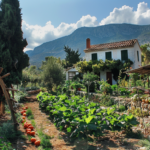Greek Honey Producing Regions: Greek honey is renowned for its unparalleled quality, natural purity, and unique flavors. The diverse landscapes of Greece, ranging from sun-kissed islands to mountainous terrains, provide the perfect conditions for producing a variety of honey types. Each region has its distinct characteristics, contributing to the rich tapestry of Greek honey. In this blog post, we’ll take a journey through the prominent honey-producing regions of Greece, exploring what makes each area special. We’ll also highlight some notable honey brands and their websites for you to explore further.
Greek Honey Producing Regions
1. Crete
Description
Crete is the largest island in Greece and boasts a rich tradition of beekeeping. The island’s diverse flora, which includes thyme, pine, and wild herbs, contributes to the distinctive flavors of Cretan honey. The unique combination of mountainous regions and coastal influences creates a rich biodiversity that is reflected in the quality of the honey produced here.
Special Features
The varied topography of Crete, from its high mountain ranges to its fertile plains and coastal areas, provides an ideal environment for bees. This diversity allows for the production of several types of honey, each with its unique taste and properties.
Notable Brands
- Cretan Honey: Known for its pure thyme and pine honey, Cretan Honey is a standout brand in the region. You can explore their products and learn more about their beekeeping practices on their website, Cretan Honey.
2. Peloponnese
Description
The Peloponnese peninsula is another significant honey-producing region in Greece. This area, especially around the Taygetos and Mainalo mountains, is famous for its thyme and fir honey. The Mediterranean climate and the region’s varied plant life result in aromatic and flavorful honey.
Special Features
The mountainous areas and the Mediterranean climate of the Peloponnese create optimal conditions for producing high-quality honey. The unique flora of the region, including aromatic herbs and dense pine forests, contributes to the distinctive flavors of Peloponnesian honey.
Notable Brands
- Melissa Honey: A renowned brand in the Peloponnese, Melissa Honey offers a range of products, including thyme and fir honey. Visit their website at Melissa Honey to explore their offerings.
3. Thessaly
Description
Thessaly, with its iconic Mount Olympus, is a key region for honey production in Greece. The high-altitude forests of this region are home to pine and fir trees, providing a rich source of nectar for bees. The honey produced in Thessaly is known for its robust and rich flavors.
Special Features
The unique high-altitude flora of Mount Olympus and the surrounding areas contribute to the distinct taste profile of honey from Thessaly. The region’s diverse ecosystem ensures a rich variety of nectar sources for bees.
Notable Brands
- Olympus Honey: This brand specializes in honey from the Mount Olympus region, known for its exceptional quality and rich flavors. Discover more about their products at Olympus Honey.
4. Epirus
Description
Located in northwestern Greece, Epirus is renowned for its production of heather and chestnut honey. The rugged terrain and diverse ecosystems of this region result in honey with a strong and distinctive taste.
Special Features
Epirus is characterized by its mountainous landscapes and dense forests, which provide a variety of nectar sources. This diversity is reflected in the complex flavors of the honey produced here.
Notable Brands
- Epirus Bee: Epirus Bee offers high-quality heather and chestnut honey, capturing the essence of the region’s unique flora. Explore their products at Epirus Bee.
5. Macedonia
Description
Macedonia, particularly the Halkidiki Peninsula, is a major honey-producing region in northern Greece. The area’s rich forests are home to pine and fir trees, providing an abundant source of nectar. The honey from this region is celebrated for its aromatic and flavorful qualities.
Special Features
The dense pine forests and the coastal influences of the Halkidiki Peninsula create a unique environment for honey production. The result is honey with a rich, aromatic profile that is highly prized.
Notable Brands
- Halkidiki Honey: Specializing in pine and fir honey, Halkidiki Honey is known for its high-quality products. Visit their website at Halkidiki Honey to learn more.
6. Thrace
Description
Thrace, located in northeastern Greece, is known for producing sunflower, cotton, and forest honey. The fertile plains of Thrace are ideal for beekeeping, resulting in honey that is both diverse and nutrient-rich.
Special Features
The fertile plains and varied plant species of Thrace contribute to the high nutritional value and unique flavors of the honey produced in this region. The combination of different nectar sources ensures a rich and varied honey profile.
Notable Brands
- Thrace Honey: This brand offers a range of honey types, including sunflower and forest honey. Discover their products at Thrace Honey.
7. Aegean Islands
Description
The Aegean Islands, including Ikaria, Samos, and Lesbos, are renowned for their production of thyme and wildflower honey. The islands’ unique microclimates and abundant herbaceous plants create honey with distinctive, aromatic flavors.
Special Features
The unique microclimates of the Aegean Islands, combined with the diverse herbaceous flora, result in honey that is both aromatic and flavorful. Each island offers a unique taste profile, reflecting its specific environmental conditions.
Notable Brands
- Ikaria Honey: Known for its high-quality thyme honey, Ikaria Honey captures the essence of the island’s unique flora. Explore their products at Ikaria Honey.
8. Central Greece
Description
Central Greece, particularly around Mount Parnassus and Mount Helicon, is known for its production of fir and pine honey. The high-altitude forests of this region contribute to the rich flavors and high quality of the honey produced here.
Special Features
The diverse flora and high-altitude forests of Central Greece provide an ideal environment for bees. The result is honey with a rich, complex flavor profile that reflects the unique characteristics of the region.
Notable Brands
- Parnassus Honey: Specializing in fir and pine honey, Parnassus Honey offers products that capture the essence of Central Greece’s unique flora. Visit their website at Parnassus Honey to learn more.
9. Ionian Islands
Description
The Ionian Islands, including Corfu and Kefalonia, produce high-quality thyme and citrus honey. The mild climate and diverse plant life of these islands result in honey with unique and flavorful characteristics.
Special Features
The mild climate and abundant citrus plants of the Ionian Islands contribute to the distinctive flavors of the honey produced here. The result is honey that is aromatic and rich in flavor.
Notable Brands
- Ionian Honey: Known for its thyme and citrus honey, Ionian Honey captures the unique flavors of the region. Explore their products at Ionian Honey.
10. Euboea (Evia)
Description
Euboea, also known as Evia, is renowned for its production of pine and heather honey. The island’s varied landscape, which includes both coastal and mountainous areas, provides a rich source of nectar for bees.
Special Features
The diverse landscape of Euboea, with its mix of coastal and mountainous areas, creates an ideal environment for honey production. The result is honey with a unique and rich flavor profile.
Notable Brands
- Evia Honey: Specializing in pine and heather honey, Evia Honey offers products that reflect the unique characteristics of the island. Visit their website at Evia Honey to learn more.
FAQ about Greek Honey Producing Regions of Greece
What Makes Greek Honey So Special?
Greek honey stands out globally for several reasons. Compared to honey from other countries, Greek honey is exceptionally rich in aromatic substances, giving it a more intense and delightful fragrance. Its low humidity content results in a denser and more concentrated honey, which enhances its richness and texture. This combination of factors makes Greek honey a premium product in the global market.
Greek honey is not only a treat for the senses but also a powerhouse of nutrients. It is packed with vitamins, minerals, and antioxidants, contributing to its status as a superfood. Additionally, Greek honey boasts antibacterial, antiviral, and antifungal properties, making it beneficial for health beyond just its nutritional content.
Why is Greek Honey So Special?
Greek honey’s uniqueness lies in its dense, aromatic profile, which results from Greece’s diverse flora and favorable climate. This honey is nutrient-rich, containing a variety of vitamins, minerals, and antioxidants, along with possessing antibacterial, antiviral, and antifungal properties. These qualities make Greek honey not only delicious but also incredibly health-promoting.
Is Greek Honey Better Than Manuka Honey?
Greek honey, particularly varieties like thyme honey, offers comparable benefits to Manuka honey but often at a more reasonable price. Both types of honey have strong antibacterial properties. However, Greek honey can be enhanced by consuming it with antibacterial herbs like parsley and thyme, or spices like turmeric, to achieve similar health benefits without the higher cost associated with Manuka honey.
Additional Resources
Greek honey is a true gem in the world of natural products, offering unparalleled quality, rich flavors, and significant health benefits. Whether enjoyed in its pure form or incorporated into recipes, Greek honey is a testament to the rich agricultural traditions of Greece.
Conclusion
Greece’s rich and diverse landscapes provide ideal conditions for producing high-quality honey. Each region offers unique characteristics that contribute to the distinct flavors and qualities of Greek honey. Whether it’s the aromatic thyme honey from Crete, the robust fir honey from Thessaly, or the nutrient-rich sunflower honey from Thrace, Greek honey is celebrated worldwide for its exceptional quality. By exploring the honey-producing regions of Greece and their notable brands, you can experience the rich tapestry of flavors that Greek honey has to offer.
This detailed guide offers a comprehensive look into the various honey-producing regions of Greece, each with its unique characteristics and flavors. For further exploration and to experience these exquisite honeys, visit the websites of the notable brands mentioned. This journey through the diverse landscapes of Greece not only highlights the richness of Greek honey but also underscores the importance of preserving these unique ecosystems that contribute to such exceptional products.
Links and Descriptions About Honey from Chef on a Bike
1. Greek Honey Cake Discover the rich flavors and traditions of Greek honey cake. This article delves into the history and recipe of this beloved dessert, showcasing the unique characteristics of Greek honey.
2. Rare Ikaria Honey Explore the unique properties of Ikaria honey, known for its exceptional health benefits and rarity. This piece highlights why this honey stands out and its significance in Greek culture.
3. Greek Fir Honey Learn about the distinct features of Greek fir honey from the Peloponnese region. This article explains its production, nutritional value, and culinary uses.
4. Health Benefits of Greek Honey Dive into the numerous health benefits of Greek honey, including its antioxidant properties, vitamins, and minerals. Understand why it’s considered a superfood.
5. Greek Honey & Manuka Honey Compare Greek honey with Manuka honey. This article discusses their similarities and differences, highlighting why Greek honey is a worthy alternative.
6. Top Raw Honey Benefits Uncover the top benefits of consuming raw Greek honey. This post covers its nutritional advantages and how it can enhance your health and well-being.
External Links with Descriptions
- Digital Heroes Caffe: Discover a range of digital marketing services and tools to help grow your online presence.
- Chef on a Bike on YouTube: Watch video tutorials and recipes to enhance your Greek cooking skills.


















